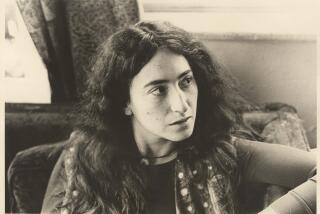Sotto Voce
Have you heard the joke about the Englishman, the Frenchman, the Italian and the Belgian whose plane loses its engines and who find they have but a single parachute?
You have not. Belgians do not figure in grand national jokes. At most they appear in yokel-type border jokes by the French on one side and the Dutch on the other. Their national character has been too indistinct and their history too shapeless or recent--a nation only since 1830--to snag a properly ringing stereotype. Also, they have no language of their own, being divided between speakers of French (the French Walloon dialect is all but extinct) and of Flemish, a variety of Dutch.
To pound the point: For a national joke you need a national stereotype; for such a stereotype you need a national character; and for that character you need a distinct history or language, preferably both. One of the difficulties with Luc Sante’s memoir, much of which seeks to explore the nature of his Belgian origins, is that it lacks even for him the gritty nub, the simplistic charcoal slash mark that allows a portrait to cohere.
Yet the failure is appropriate to the idiosyncratic, highly intelligent book that Sante has attempted. If there is both fine observation and odd stiffness in his treatment of Belgian history and culture, of the town of Verviers where he was born and of his family, there is a clue to these qualities in his larger theme.
“The Factory of Facts” is a memoir written less to recapture the past than to get rid of it. Conceive memory as a limb that is fractured and hurts to walk on: Sante’s particular fracture is his bicultural condition.
His family moved to New Jersey when he was 6, after the Verviers factory where his father was production manager closed down. His home life was utterly Belgian; his parents, though respected and modestly comfortable, formed few intimate ties with their neighbors. Luc, on the other hand, was out in America from kindergarten on. Part of him clung to his parents’ culture, preferred it to what he found around him and was reluctant to dump it.
“But dump I did. Willfully, accidentally, organically, negligently, crudely, systematically, inevitably I got rid of a section of myself, a part that was once majority and shrank to accessory. I went from being the little Belgian boy, polite and diffident and possessed of a charming accent, to a loutish American adolescent.”
He went on to become a fine writer and a discriminating literary and cultural critic. Today, he writes, he talks to dogs and cats in English. “English became my rod and my staff, my tool and my weapon, at length my means of making a living. My mask merged with my skin.”
Or did it? Now, when someone calls him “Luc” with a French pronunciation, “I jump as if I’d gotten an electric shock. Even though I know better, I feel as if someone had just looked down into my naked soul.”
Sante’s memoir is a prolonged act of wincing and holding on. Looking into his own bifurcated soul produces its own short circuit. By the end of the book, he has told us a great deal about his loving, cautious and conventional mother and the pious rural family she came from. (In the Ardennes region, he writes, there were two sects: Catholics and those who had quarreled with their priest.)
He has told us of his father, hard-working but touched with language and, for a while, an actor in a local Walloon theater group. In times of crisis, Sante senior would emit literary quotations in mockingly inflated tones. He did it, Sante explains in a marvelous phrase, “because chance and ritual balanced each other . . . and because the turn of phrase was the most elegant of life preservers.”
Such a transforming comment does not recur very often. Sante writes in scrupulous detail of the flourishing industrial past of Verviers and of the old folkways of the Ardennes countryside. He writes of the history of what is now Belgium, a virtually indecipherable palimpsest scribbled successively by the counts of Flanders and the dukes of Burgundy, and by Austria, Spain, the Netherlands and France.
He details rather tediously his efforts to trace his family genealogy; he discusses religious observances, manners, inhibitions, weather and the growing conflict between French and Flemish speakers. He circles and circles about; not until well along does he nerve himself to the question: “So what makes it a country?”
The answer is a witty authorial collapse: a list of shards. Among them: “Baked goods. . . . The habit of discretion. . . . The color gray. . . . Varnished wood. . . . Silent children, well-bred dogs, unassertive houseplants. . . . A taste for scandal, especially morbid scandal. . . . Leeks, chervil, gherkins, pickled onions. . . . White linen tablecloths, fanned linen napkins. . . . The perpetual imminence of rage, blasphemy, running amok. . . . Trees like fists. . . . Pale yellow, brick red, black.”
He writes of his life with his parents in New Jersey with a different kind of disjunction. He is observant and graceful, yet a distance separates the writer, not only from his mother and father but also from himself. Here, as with the Belgium chapters, we sense the distance.
It is strange to be invited into a memoir only to have the memoirist hold himself aside. It is like being invited to play, as a child, only to have your host ignore you. Lacking a narrator’s relish, you wonder: Why am I here in Sante’s brittle account of life in Summit, N.J.? And do I want to be set down in the 1920s Walloon literary revival with a reluctant guide?
Yet along the way there are gleams of arresting insight. Something seems to be afoot, as if the author, estranged inside his memoir, were signaling to be let out. Most suspicious is the nonsensically exhilarating prologue: eight wildly different summaries of the family story to come. The father will make a fortune in Verviers or the Congo, or they will all miserably starve, or Luc will become a dissolute playboy or a missionary priest, or they will go hilariously off to Biarritz to get fabulously rich at the gambling tables. (“It didn’t work.”)
What does it mean? Why is this prefatory mock memoir not only more scintillating but also more real than the real one that will follow? Near the end, the incandescent critic comes to the rescue of the sluggish memoirist, and we get the answer.
Sante recalls the place occupied by certain fundamental words he had learned in French and how their English equivalents could never dislodge them. He was a garcon, not a “boy.” He had a maman and a “papa,” not a mom and dad. He lived in a maison with “a house on either side.”
Archetypal words, with their deep roots, lose some of their force as you continue to use them while growing older and more autonomous. Had he been brought up in French, Sante reflects, “je would become more than his private self, would find itself shoulder to shoulder with the je of a million others.”
For him, cut off from French, these words remained encysted and lethal, as he grew bigger, in their undiluted familial constriction. He had to excise them. Yet doing so deprived him of the magic, benign in its eroded form, that gives a memoir its magic.
“To speak of my family, for example, I can hardly employ English without omitting an emotional essence that remains locked in French although I can’t use French, either, unless I am willing to sacrifice my critical intelligence,” Sante writes. For his memoir, written in English, the sentence offers a judgment more precise and more illuminating than any this reviewer can provide.
More to Read
Sign up for our Book Club newsletter
Get the latest news, events and more from the Los Angeles Times Book Club, and help us get L.A. reading and talking.
You may occasionally receive promotional content from the Los Angeles Times.






